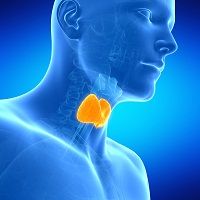Treating Patients with Resistance to Thyroid Hormone
Resistance to thyroid hormone (RTH) occurs in rare patients and its clinical presentation is considerably different than that seen in the usual hyperthyroid patient. Patients with this inherited condition produce inordinate levels of thyroid hormone because their negative feedback loop at the pituitary gland is metaphorically snipped. Concurrently, they have normal levels of thyroid-stimulating hormone.

Resistance to thyroid hormone (RTH) occurs in rare patients and its clinical presentation is considerably different than that seen in the usual hyperthyroid patient. Patients with this inherited condition produce inordinate levels of thyroid hormone (TH) because their negative feedback loop at the pituitary gland is metaphorically snipped. Concurrently, they have normal levels of thyroid-stimulating hormone (TSH).
Thyroid hormone receptors (THR) are found beyond the pituitary in the liver, kidney, heart, inner ear, and many more sites. No specific approach has been endorsed for RTH, but some clinicians employ medications that decrease TSH levels or antagonists to thyroid hormone itself. The heterogeneity of patient treatment responses to these approaches has made selection of a best practice difficult.
Presently, an article published ahead-of-print in The American Journal of the Medical Sciences suggests organized approaches for RTH treatment.
The article uses a case study to teach. A 27-year-old patient presented to the authors’ institution with slightly elevated TH levels, normal TSH levels, and symptomatic palpitations. The authors collected blood samples from consenting family members of the patient for genetic testing. The patient’s mother and elder brother had A234T THR-β heterozygous mutations; RTH patients may also have point mutations at the THR-βR320C or the THR-βR243Q genes. Both relatives also had palpitations and goiter, but no other hyperthyroid symptoms.
Most RTH patients are asymptomatic and need no medical treatment. Anti-thyroid hormone medications can increase TSH levels leading to increased risk of goiter formation and/or pituitary adenoma.
When RTH is suspected and symptomatic, the authors suggest starting differential diagnosis by excluding TSH-secreting pituitary adenoma. Next, genetic testing for THR-β mutations can identify RTH early.
Patients may present along an inconstant symptom continuum because distribution of mutated receptors throughout the body varies considerably between patients. Areas with lower mutant receptor census experience excessive stimulation (and more symptoms). Areas with higher populations of mutated receptors experience normative stimulation at elevated TH levels. Patients may have traditional signs, or present with symptoms like ear nose and throat infections, hearing deficit or decreased bone mass.
Dextrothyroxine (DT4) has shown efficacy in heterozygotes of the THR-βR320C mutation but not in homozygous mutant patients. TRIAC (an inactive thyroid hormone analog) lowers TSH levels and brings symptomatic relief but has not been studied long-term (the longest use in a patient has been 5.5 years).
Bromocriptine has not been studied in RTH but is expected to have clinical utility based on its pharmacology at the hypothalamus.
The authors concluded that the A234T THR-β gene mutation (found in the patient and family) can cause RTH via defective corepressor release. Anti-thyroid medications can provide symptomatic relief but increase risk of goiter development. Paradoxically, thyroid hormone supplementation may be warranted in patients with massive goiter or hypothyroid symptoms.